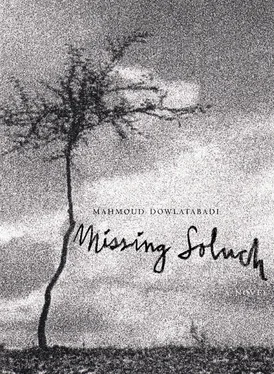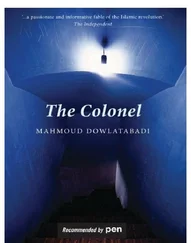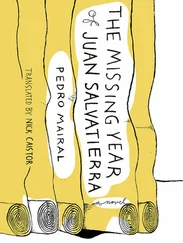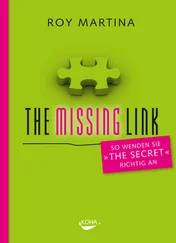“I’m considering heading over to Shahrud this trip, and maybe I’ll buy some sheep oil there. I’ll also stop by the mines there and see if I can’t find out something about Soluch for you. Don’t worry yourself too much! You’ll just end up sick from it, and that’s no good! Say goodbye to Ali from me as well.”
He raised one leg up and pulled himself onto the donkey, riding it down the road. His long legs were not far from the ground. It looked as if the tips of his shoes were scraping against the dirt. One last time, he called out, “Goodbye!”
“God protect you.”
Then he disappeared down in the alleys, all but the tip of his hat, and then that too fell out of view.
Mergan returned to the house.
Abbas was sitting on his feet now, and he spoke up suddenly, “May God forgive the Sardar for his mistakes. Amen!”
Abbas sounded like a yelping dog. Mergan waited, looking and listening in the hope that Abbas might continue and say something more. But he fell silent. He leaned his head back against the wall and shut his eyes. Mergan stayed there staring at her son, wondering what he was thinking, how he was feeling. Where did his thoughts take him, her suddenly aged son?
Oh, if only it had been your mother and not you, Abbas!
What was the wall that had arisen between mother and her son, between their hearts? It was impossible to relate to him, to speak to him, to listen to him. An ancient fortification had arisen around Abbas, an old, ancient rampart. What had happened to him?
Oh God! My son left the house a boy and returned an old man. I don’t understand it. Why won’t he speak?
He was silent. Abbas said nothing, as if he were locked shut. On the rare occasions that he did speak, the sound of his voice and what he said were so strange that they only increased her confusion. Some people came on the first day or two, staring at Abbas before leaving. Some of the older villagers suggested he was in shock, but they too left right away. They left, everyone left, and Abbas remained behind, in the house. Silent, like an owl. He stayed there with Mergan, a burden to her, but also lodged in her heart. Quiet, old Abbas, sitting in the corner. Isn’t this what they mean by being homebound? Abbas was now homebound. He would hardly ever even stand up. Isn’t this what they mean by being an invalid?
The spring had passed and summer was coming on. The time for cotton ginning and harvesting. And so Mergan always had one foot inside the house and one foot outside. She couldn’t leave Abbas to himself. But she had to work as well. Harvesting and picking work was available. She had to go to the fields for gleaning. She couldn’t just leave the land fallow, but she had no hopes that Abbas would suddenly stand up and take care of himself!
Mergan, you fool! You were going to go and find medicine for your daughter. Why are you just sitting here instead?
“May God overlook your faults, Sardar!”
Abbas rose in the dark room, taking his cane and leaving the house. He walked slowly, step by step, down the alley, leaning from time to time against a wall for support. The sun was peeking into the alley, over the walls, and onto the rooftops. There was no sound to be heard, and no sign of life to be seen. Abbas continued, walking with his back hunched and knees bent. He held himself up with one hand against the wall, moving slowly, like a turtle. He looked ghostly. His hair had grown long and curly and was matted like a piece of felt. Mergan had once tried to cut his hair, but was scared away by the look in Abbas’ eyes. So the hair had grown longer and longer. And the longer his hair grew, the larger his head seemed and the smaller his face appeared within it. His face had seemed to shrink smaller, giving his eyes and nose a resemblance to those of a field mouse. Within their sockets, his eyes looked dry, wider — profound but also disturbing. His hunched back, prominent nose, and his eyes — which were both frightened and frightening — all made him look more and more like some manner of rodent.
In the empty alleyways of Zaminej, Abbas walked slowly, without shoes, his gray shirt torn and his head overflowing with white hair; he looked like a strange creature. He was headed to the house of the Sardar, out on the edge of the village. The wall behind his house divided the barren wastelands from the village proper. Although the Sardar’s house was not very distant, it seemed to Abbas to take forever to reach it. In truth, it was well before noon when he arrived; the sun was still shining at an angle.
The camel’s gate was the only entrance into the Sardar’s home. Abbas entered the vestibule. The camels were scattered around the yard. He walked straight ahead to the Sardar’s room, the door to which was open. The Sardar lived alone with his camels. A half-finished bowl of buttermilk and some leftover dry bread was scattered beside the wall. Flies covered the bowl and the bread. The Sardar himself was asleep, using his shoes as a pillow. Abbas entered the room, walked quietly over, and knelt beside the man’s sleeping body. He sat there, like a statue. He was silent except for the sound of his breathing, inhaling and exhaling.
How long he was sitting there, he couldn’t say. But eventually the Sardar seemed to sense the sound of another’s breathing. He lifted his forearm from his eyes and opened his eyelids, seeing Abbas sitting beside him. In normal circumstances, the huge Sardar was not the kind to be frightened by the appearance of someone like Abbas, but the time and manner of the boy’s appearance beside him clearly brought a shadow of fear around his heart.
Unconsciously, the old man pulled his limbs together and pushed himself back against the wall, staring at Abbas’ eyes for a moment. Abbas did not react, other than to continue looking back at the Sardar. The man slowly began to emerge from his confusion between sleep and wakefulness. He eventually regained his composure, and with a cough that seemed unlike him, he glared sharply at Abbas with jet-black eyes.
“Well, what do you want? In the state you’re in, and under this hellish sun, what’ve you come here for?”
Abbas responded in a broken and sad voice, “My pay. I want my pay.”
When the Sardar comprehended Abbas’ request, he leapt from his place, saying, “Your pay? Fine, if you want that, go bring your mother and I’ll deal with her myself!”
A moment later, Abbas rose and limped out the door, heading toward the vestibule. There was a jug of water by the wall. Abbas knelt and struggled to lift the jug, then raised it to his lips and drank deeply. Then he set the jug back down with a struggle — the same jug he once could raise with one hand. As he rose, he saw the old mare camel stretching its neck toward him with a look of warm familiarity in its eyes. Abbas suddenly felt the pain in his shoulder and leg return. There was something about the look of the camel and the feeling of standing in the sun. The sun, the camel, the fields, the well. The snakes … A tremble passed through Abbas’ battered body. Despite the fact that Abbas had overcome his terrifying memories enough to walk all the way to the Sardar’s house, the sight of the old mare had rekindled the pain still caught within his body.
He held to the wall as he stood. The sun and the long walk had exhausted him. It was exactly noon, and the empty paths of the village at midday were burning his feet. Sweat, both from the heat and the effort it took to walk, was pouring down his face. His large head was too heavy for his thin neck. He couldn’t control his head; it swung from side to side, making him dizzy, and his vision would go black. His eyes were lost in the dust, in the dusty sunlight. He felt weak, but he had to return home somehow. Even if the sun was not very hot, it felt as if it was sucking the blood from him. He began walking, but with great difficulty. He dragged his body, hunched and broken as it was. His legs had lost their strength, his heart felt weak, and his eyes were covered with dust. No, he couldn’t go on. He simply couldn’t go on. He felt his strength wane, so he leaned his back against a wall in the alley. His knees gave way. His body folded, crumbled, and fell onto the ground. He lay in the sun. The sun was hot; the earth was hot. It had never seemed so hot before. But perhaps it’d always been like this. Abbas had no further strength to draw upon; he felt like he was nothing. He felt he was evaporating. Little by little. He seemed like light; he seemed like dust.
Читать дальше












